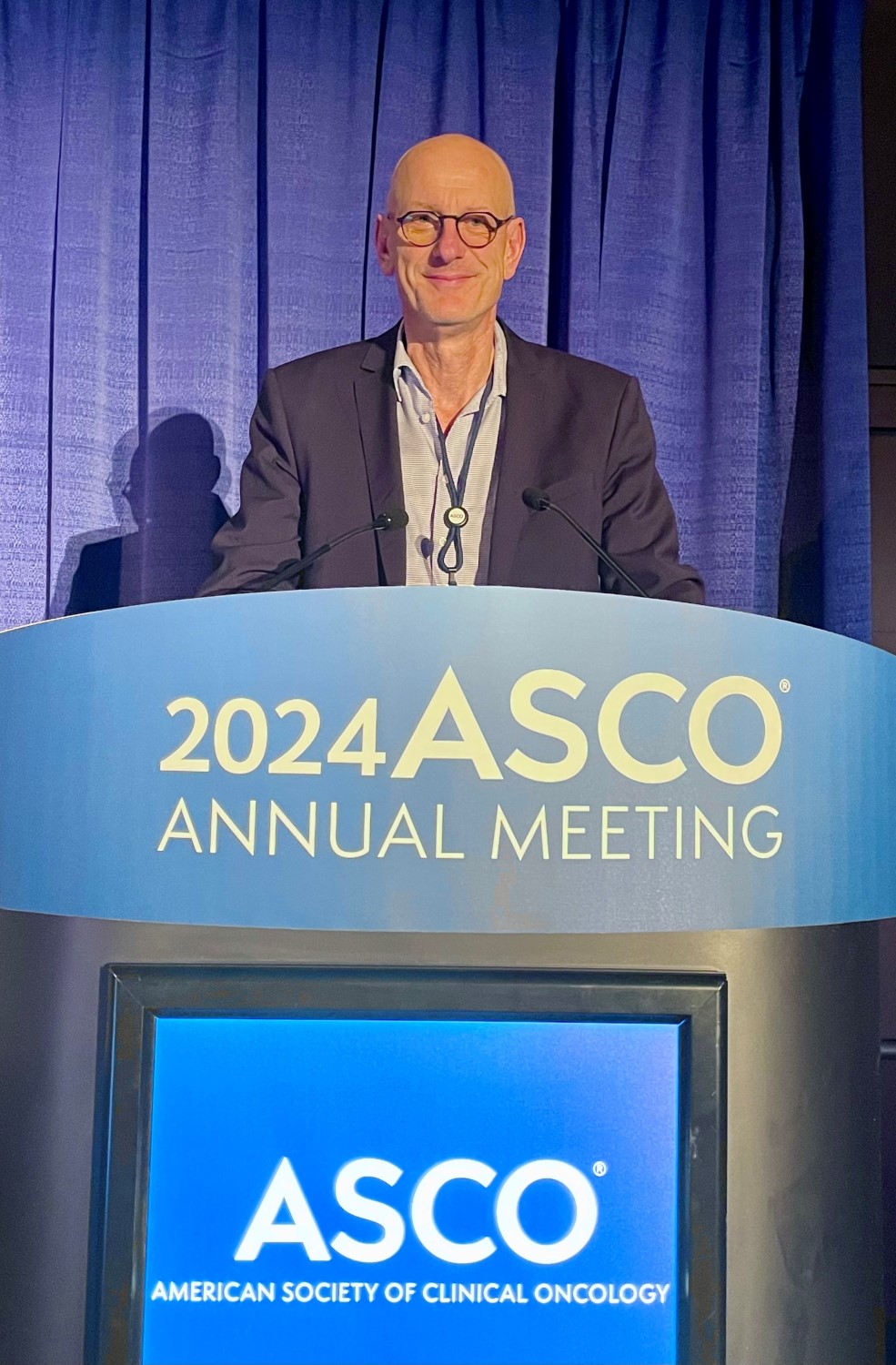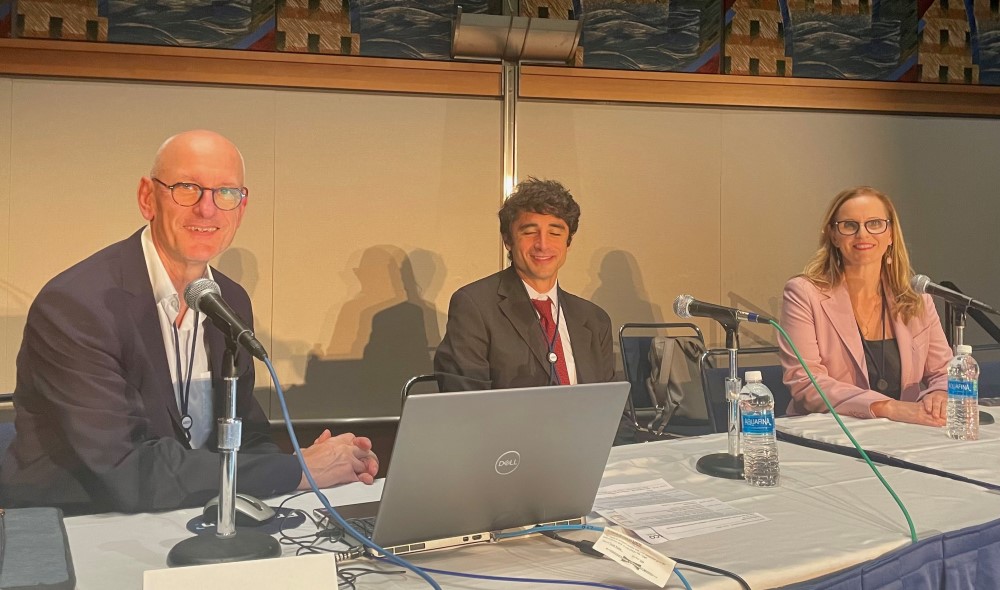ASCO 2024 conference - Surgical challenges in gynaecological cancer
Brief report from the American Society of Clinical Oncology (ASCO) conference
 I had the great honour as one of only a very few selected Australian clinicians of chairing an educational session titled “Surgical challenges in gynaecological cancer” at the recent conference of the American Society of Clinical Oncologists (ASCO) in Chicago, IL. My co-presenters were the very renowned gynaecological oncologist Dr Emma Rossi from Duke University, NC and Dr Amer Karam from Stanford University, CA.
I had the great honour as one of only a very few selected Australian clinicians of chairing an educational session titled “Surgical challenges in gynaecological cancer” at the recent conference of the American Society of Clinical Oncologists (ASCO) in Chicago, IL. My co-presenters were the very renowned gynaecological oncologist Dr Emma Rossi from Duke University, NC and Dr Amer Karam from Stanford University, CA.
The ASCO conference is the world’s largest cancer conference with more than 40,000 medical professionals gathering every year in Chicago. There is no other conference centre in the world than could host as many delegates.
To see so many professionals gathering to exchange their experience in their fight against all types of cancers was humbling. It was equally nice to catch up with some colleagues and friends and have time to chat.
The session I chaired was about “Navigating the challenges in gynaecological cancer surgery: Striking the Balance Between Surgical and Non-Surgical Patient Management”. While surgery has a key role in the treatment of uterine/endometrial, ovarian, cervical and vulvar cancer, its extent and radicality as well as its timing are debated amongst the world’s top specialists.
Ovarian cancer
We discussed the role of neoadjuvant chemotherapy in ovarian cancer. Dr Karam’s usual practice is to give 3 cycles of neoadjuvant chemo and then he takes his patients to the operating theatre. Interestingly, he interprets the data from five large trials in such a way that he takes patients for surgery, regardless of whether they had a good or a poor response to chemotherapy.
This is in contrast to what we do here in Queensland and in most parts of Australia, where we do check the response to chemo. If a patient had a good response, we will offer surgery. If we are unsure about the response, we perform a day-laparoscopy to find out what the response was and to inform further steps. If the neoadjuvant chemotherapy was ineffective, the Queensland team would normally advise against an operation because its chances of success are minimal. We would modify the chemotherapy to achieve a better response first, before we operate.
This question is very important though because it’s clear that my colleague in Stanford would generate much more morbidity from surgery on his patients than we do; but we have no evidence if this strategy actually translates into a survival benefit.
Endometrial cancer
Minimally invasive surgery for hysterectomy and surgical staging through sentinel node biopsy is still the standard surgical treatment for endometrial cancer. However, My colleague Dr Emma Rossi from Duke University pointed out that alternative surgical options are becoming increasingly popular and safe because more evidence becomes available through research that supports them.
For example, our Australian ENDO3 trial is well regarded internationally and it is known that it will examine if sentinel node biopsy should be continued as part of routine endometrial cancer surgery; or stopped. New molecular tests will become available for routine use to help decide what groups of patients might benefit from more or maybe less invasive surgery.
Dr Rossi was also aware of the Australian FeMMe trial that treated 165 patients with a progestin-intrauterine device for 6 months. More than half of patients achieved a complete pathological response, where no endometrial cancer can be detected histologically. Currently, our science team working closely with Dr Eva Baxter, works on predictive factors that can predict who will or will not respond to the progestin treatment. Once that is known, we can develop molecular treatments that will be as effective as surgery to treat endometrial cancer. However, this is part of our long-term vision and will still take some time.
Vulvar cancer
I presented our new trial concept of groin ultrasound surveillance to potentially replace groin lymph node dissection in vulvar cancer. This is a very bold and ambitious project that will kick off in 2025 as a National Australian Vulvar Cancer trial (ANVU).
Patients who agree to participate will be randomly allocated to either groin ultrasound monitoring and groin surgery if the groin nodes show changes on ultrasound during the study period; versus upfront groin node dissection. The trial will give us a definitive answer as to whether groin node dissection can be replaced by ultrasound monitoring and surgery only when needed.
We received very generous philanthropic funding already but more funding will need to be secured to complete the trial. It will enrol 240 patients from all Australian States as well as from Darwin (NT) and from overseas. We expect first results to become available in 2030.

There were many other intriguing presentations, including one about ovarian cancer screening. This group has successfully developed a new ovarian cancer screening test that they wish to trial.
I can assure you that the amount of medical and scientific research that is going on globally is very encouraging and one would hope that medical research will produce a cure for most cancers types in the next 20 to 30 years.
Best wishes,
Prof Andreas Obermair
